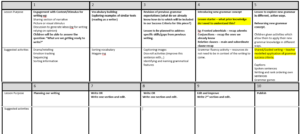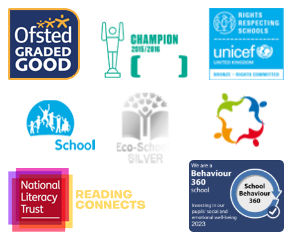What we do:
At St Mary’s, writing is taught in a progressive and systematic way, beginning in Reception and Year One with the ‘Little Wandle’ phonics programme and then later through meeting the aims of the National Curriculum.
Our writing approach is based on developing our children’s fluency as writers and engaging them through exciting learning sequences where children develop: spelling, vocabulary, grammar and their own authorial voice.
In English lessons we study the work of great writers, from speech makers and novelists to historical letters and information books.
Early Writing:
In Reception, Year 1 and the first half term of Year 2, children are taught to write and spell through our Systematic, Synthetic Phonics programme (Little Wandle) and they write on a daily basis in their phonic lessons. In Reception, teachers plan for writing skill development outside of direct teaching time via the continuous provision. Stimuli for writing are planned into the provision and enhancements to the provision are planned for. Practitioners take writing objectives into the provision by using an ‘Objective Led’ teaching approach. For example: a teacher might engage with children in the small world role play and then introduce a map for the journey the characters are going on, to encourage mark making and fine motor development and then might suggest labels for the places they visit and support transcription using a phonics mat. As children become more proficient in segmenting for spelling, wider opportunities and more enhancements are planned into the provision.
Years 1 – 6:
English lessons are taught daily across the school. A common short-term sequence has been developed by Senior Leaders over several years based on our own research into what works best for our pupils. The sequence allows us to develop the context of a text: we read and appreciate its content, learn and engage with the related vocabulary, revise grammar already taught (in context), teach new grammar (in context), practice grammar (sometimes in pairs and groups), plan our writing, write (sometimes in pairs and groups), edit with others or in response to feedback from adults and sometimes publish work.

Medium Term Planning and the sequence of units is crucial to the projects that our children study and how we explore both our Project Values and our Project Questions. Links between English and other subjects are actively used to embed language and the development of authorial voice. Sometimes the sequence of English and Project lessons are manipulated when this makes sense to the context of project learning and development of knowledge.
Priority Objectives:
Our response to catch-up, after the lockdowns, during the pandemic, was to prioritise the objectives that we taught. We focussed on word and sentence level objectives and limited our feedback to pupils on these. The results of this practice have been excellent and we have embedded this practice into how we now organise learning in English. Priority Objectives are focussed upon during the Autumn and early Spring terms; after this, all objectives are covered. The organisation of our English curriculum in this way has resulted in accelerated rates of progress.








